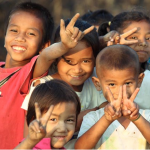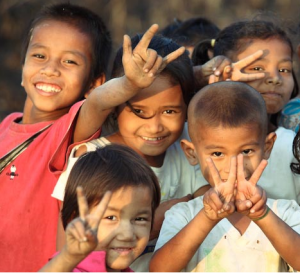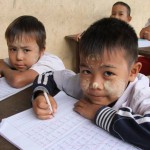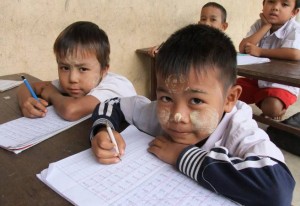
 Over 230,000 migrants from Myanmar reside in Tak Province, migrating to Thailand due to political instability, conflict, or lack of economic opportunity in their home country. Although many parents are able to find work, their children often are unable to go to school and receive a consistent education. In response to the lack of an education for their children, migrant communities developed community schools known as Migrant Learning Centers (MLCs) designed to address a short-term problem. However, the migrant community has endured over the last three decades and long-term, systemic solutions for providing education to these children has not yet been fully established. The Myanmar and Thai governments are communicating about how to best serve the children in these migrant communities resulting in recent initiatives to create clear pathways to accredited education. Despite the promise of an accredited education, the nascent implementation of these initiatives has not yet reached most of the children who need it the most. As donor priorities shift into Myanmar to support the country’s democratic transition, MLCs are losing funding putting them at risk of closure and leaving migrant students with no access to education. With over a decade of experience working in this context, World Education (WE) and local partners have identified 1,000 children that could be without access to education next school year due to the closure of MLCs, putting them at a higher risk for human trafficking and exploitation.
Over 230,000 migrants from Myanmar reside in Tak Province, migrating to Thailand due to political instability, conflict, or lack of economic opportunity in their home country. Although many parents are able to find work, their children often are unable to go to school and receive a consistent education. In response to the lack of an education for their children, migrant communities developed community schools known as Migrant Learning Centers (MLCs) designed to address a short-term problem. However, the migrant community has endured over the last three decades and long-term, systemic solutions for providing education to these children has not yet been fully established. The Myanmar and Thai governments are communicating about how to best serve the children in these migrant communities resulting in recent initiatives to create clear pathways to accredited education. Despite the promise of an accredited education, the nascent implementation of these initiatives has not yet reached most of the children who need it the most. As donor priorities shift into Myanmar to support the country’s democratic transition, MLCs are losing funding putting them at risk of closure and leaving migrant students with no access to education. With over a decade of experience working in this context, World Education (WE) and local partners have identified 1,000 children that could be without access to education next school year due to the closure of MLCs, putting them at a higher risk for human trafficking and exploitation.
Through an anonymous donor, World Education along with partners Burmese Migrant Workers Education Committee (BMWEC) and Migrant Education Coordination Center (MECC) is providing immediate access to accredited education for migrant community children while simultaneously supporting the Thai and Myanmar governments’ progress towards implementing a long-term solution. PACE focuses on strengthening the sustainability of MLCs by providing teacher training, implementing a quality learning framework, and establishing parent teacher associations that will financially contribute or fundraise for their child’s MLC. In working with the Thai and Myanmar governments, PACE will ensure that both systems are collaborating and working towards establishing standards that will make it easier for students to have their MLC education recognized and allow them to either enroll in Thai government schools or if upon returning to Myanmar, be able to enter a Myanmar government school at their appropriate academic level. Along with helping to facilitate the accreditation process, World Education will also be working to build the financial and organizational capacity of its local partners BMWEC and MECC, to ensure that they are prepared to support the migrant community’s continued access to accredited education for the migrant communities and future generations.
Click here to learn more about PACE and the impact the project is already having on migrant students along the border.

 The USAID-funded Project for Local Empowerment (PLE) works toward sustainable solutions on the Thailand-Myanmar (Burma) border, building the capacity of local government and organizations to take the lead in providing social services to displaced persons from Myanmar. World Education implements the education component of this project in five provinces and seven refugee camps in Thailand and four states in Myanmar.
The USAID-funded Project for Local Empowerment (PLE) works toward sustainable solutions on the Thailand-Myanmar (Burma) border, building the capacity of local government and organizations to take the lead in providing social services to displaced persons from Myanmar. World Education implements the education component of this project in five provinces and seven refugee camps in Thailand and four states in Myanmar.
People from Myanmar have taken refuge on the Thailand-Myanmar border for over 30 years due to conflict and economic hardship. Approximately 130,000 refugees from Myanmar live in refugee camps along the border, well over 400,000 live unofficially in Thai communities along the border, and many more are displaced within the southeastern states of Myanmar bordering Thailand. Some of these displaced persons have lived along the border for a decade or more and have witnessed entire generations of children grow up there. World Education works to create education opportunities for children in these communities so that someday they may return to Myanmar and actively partake in its transformation.
World Education works with the International Rescue Committee, Mae Tao Clinic and The Border Consortium, as well as local NGOs and government agencies to implement projects that increase access to and improve the quality of education for displaced Burmese in Thailand and southeastern Myanmar. World Education trains teachers and school administrators, develops curricula and teaching materials, and supports special education, higher education, and community initiatives such as Parent-Teacher Associations (PTAs).
Map of PLE project area within in Southeast Myanmar.
